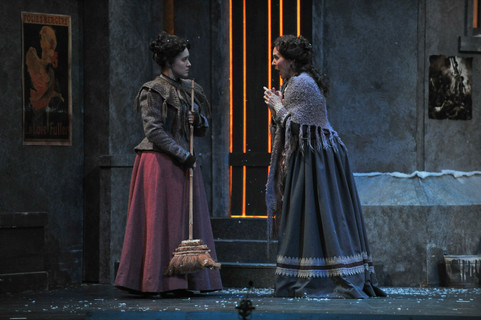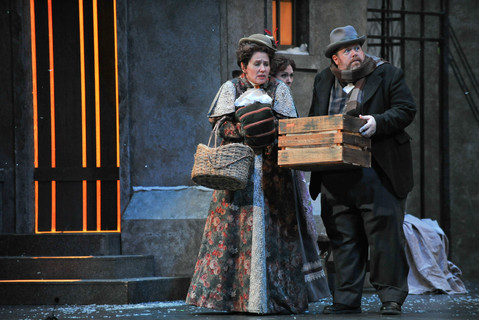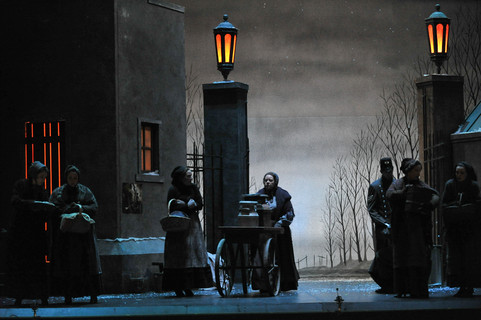FWO Archives: Puccini's La Bohème (2013 Festival & a 72-Year Retrospective)
- Fort Worth Opera

- Dec 11, 2020
- 9 min read
Giacomo Puccini's wintry tale of love and loss, La Bohème, has captivated international audiences for over 120 years and played to rapturous applause in North Texas since its first Fort Worth Opera performance in 1948. The company has presented the beloved classic twelve times over the past 72 years. We hope to share this heart-rending masterpiece with new audiences and opera lovers throughout our community once again in a future season. This week we wind the clock back to 2013 and offer you a glimpse of some incredible productions over seven decades.

SYNOPSIS OF SCENES

Act l: Christmas Eve. Latin Quarter, Paris, c. 1890.
In their cold attic apartment, the poet Rodolfo and the painter Marcello struggle to keep warm, eventually burning part of Rodolfo's manuscript to heat the room. Soon their friends Colline, a philosopher, and Schaunard, a musician, arrive with food, wine, and cigars purchased with the money from Schaunard's new employment - playing the violin to an eccentric Englishman's parrot. A knock interrupts their revelry, and their landlord Benoit enters to collect rent. The four friends entice him with wine and pretend to become offended when he boasts of an amorous conquest, kicking him out with feigned indignation. Afterward, they depart for a celebration at Café Momus while Rodolfo stays behind to write, promising to join them later. A second knock and a woman's voice interrupt his solitude. Mimi, a neighbor, explains that her candle has gone out on the stairs. As she enters she is seized by a coughing fit and fainting spell. Rodolfo revives her with wine and relights her candle. As she begins to depart, she realizes she has dropped her key and both of their candles are blown out by a gust of air. The two search for the key in the darkened room. Clasping her hand, Rodolfo describes his life as a poet and his dreams for the future ("Che gelida manina," What a cold little hand). Mimi, in turn, responds to tell him of her life as an embroiderer Mi chiamano Mimi," Yes, they call me Mimi). They realize that they have fallen passionately in love ("Oh soave fanciulla," Oh lovely girl), and they depart for Café Momus together.

Act Il: The square with Café Momus.
In celebration of Christmas, a large crowd has assembled in the square. Rodolfo introduces Mimi to his friends and buys her a bonnet from a vendor. Together the four characters enter the café and begin to dine. Musetta, Marcello's former lover, enters on the arm of her current admirer, the wealthy and elderly Alcindoro. It is clear that she has tired of him, and upon seeing Marcello, tries to attract his attention by boasting of her popularity ("Quando me'n vo'," When I go along) as Marcello struggles to hide his interest. To rid herself of Alcindoro, she complains about her tight shoes, dispatching the older man to buy her a new pair. After he departs, Musetta and Marcello fall into each other's arms. The arrival of their supper bill causes alarm - Schaunard has lost his purse and the group cannot pay. Musetta charges the bill to Alcindoro. As a military band passes, the six comrades escape into the crowd, leaving the dumbfounded Alcindoro to pay when he returns.

Act Ill: A toll-gate on the Orléans road into Paris.
From the cold, snowy street, Musetta and large group are heard inside a tavern. Mimi, coughing violently, enters in search of Rodolfo but finds Marcello instead. She recounts Rodolfo's terrible jealousy and the hard life they have together ("O buon Marcello, aiuto!" Oh, good Marcello, help me!). Rodolfo emerges from the tavern and Mimi hides. Rodolfo tells Marcello that he wants to leave Mimi, describing her as a fickle, heartless creature. He eventually confesses however, that his jealously is not real. Rather, he fears that Mimi is incurably ill and her condition will only worsen in the poverty they share. His false unkindness is meant to drive her into the arms of a wealthier man who can better care for her. Mimi's coughing alerts Rodolfo to her presence and, at first, they decide to separate amicably. Then realizing that their love is too strong, they agree to remain together until spring. Meanwhile, Marcello has been drawn back into the tavern at the sound of Musetta's flirting. They begin to argue - a direct counterpoint to the other couple's reconciliation ("Addio dolce svegliare alla mattina! Goodbye, sweet awakening in the morning!)

ACT IV: The attic apartment, some months later.
Rodolfo and Marcello lament their loneliness and reminisce about their former lovers. The mood improves when Colline and Schaunard enter with a meal, and the four stage a dance that turns into a mock duel. The revelry is shattered when Musetta arrives with the news that Mimi, having left her wealthy patron, is downstairs and near death. Rodolfo rushes to her, carries her up the stairs, and makes her comfortable on a bed. Marcello leaves with Musetta to sell her earrings to buy medicine while Colline withdraws to pawn his coat. Alone together, Mimi tells Rodolfo that her love for him is her whole life ("Sono andati?" Have they gone?). The former lovers recount their initial meeting and past happiness. Assuring Rodolfo she feels better, Mimi falls asleep. The other characters return with medicine, but it is too late. Mimi died quietly and without notice. Finally realizing she is dead, the griefstricken Rodolfo throws himself on her lifeless body.
Synopsis by Christina Kucan, PR/Communications Specialist, and Hannah Guinn, Director of Fort Worth Opera Studio/Education.

Production Notes

Born into a family of composers in the Tuscany region of Italy, Giacomo Puccini (1858-1924) learned at an early age to cherish drama. His early exposure to touring presentations of plays instilled in him a particular love of tragedies. By the age of 18 and already a budding composer, Puccini decided to focus entirely on composing opera, which soon lead him to study at the Milan Conservatory. His gift for lyrical and rich orchestral composition quickly set him apart and garnered the attention of Giulio Ricordi, the powerful music publisher, who used his influence to obtain the works of the best poets and librettists for Puccini's use.
La Bohème (1896) was Puccini's fourth opera. The first was Le Villi 'The Witches"), written in 1884 for a contest held by La Scala, the famed opera house. His opera did not win, but La Scala opted to produce it for the next season anyway, though not to great acclaim. La Scala also premiered his second opera, Edgar, in 1889, and while its Composition was praised by the critics for Puccini's advancements from his first opera, they ultimately derided it for mediocrity. Manon Lescaut (1893) was his third opera and his first major success - so much so that it put Puccini on the worldwide stage. Many critics crowned the young composer as the natural heir to Giuseppe Verdi, Italy's cherished opera icon. Immediately after Manon Lescaut, Ricordi secured the talents of Luigi Illica and Giuseppe Giacosa, both renowned playwrights, to versify Henri Murger's novel Scènes de la vie de bohème for Puccini's fourth opera. They worked well together, and over the next decade these three men, librettists and composer, combined talents to birth the three operas that cemented Puccini's legacy: La Bohème, Tosca, and Madame Butterfly.

Despite some critics recognizing Puccini's talents, overall the critical reception of La Bohème was cool and to this day some continue to condemn the opera as emotionally manipulative. At the time of its premiere, at least one critic condemned it as an operetta rather than an opera. Some critics considered the music trivial and the opera a mere tearjerker. One critic in New York called it "summer operatic flotsam and jetsam." Even years later, composer Dmitri Shostakovich commented sarcastically that Puccini writes marvelous operas but dreadful music." Puccini while a gifted composer, never was one to obey the "rules" of composition, a charge that other composers often leveled to discredit him. However, wherever La Bohème premiered the public's adoration of the opera was immediate and obvious. In Palermo alone the audience remained in the theater until the entire final scene received an encore performance.


It seems the audience was ahead of the critics' in terms of shifting sensibilities. By the time of the opera's premiere, Romanticism, which had dominated a great part of the 19th century,
was losing popularity. The Romantic Movement emphasized imagination and emotions, but by the end of the century those very attributes were becoming seen as artificial sentimentality. Overall Italy was afflicted severely with such political, social, and economic upheavals that stability seemed unattainable to most of the people. The country could be divided into the north, which was the far more stable region and enjoyed industrial development, and the south, which was practically still stuck in a medieval society dominated by illiterate poverty and lacking law and order. Living in such a harsh reality made the dreamy, romantic fantasies distasteful, and artists felt the need to find a more accurate way to express themselves. As a result Naturalism evolved as a genre to reflect the world they saw - a world inhabited with credible people in realistic situations expressing passion and emotion with swift action.


Opera as an art form was not immune to the criticism aimed at Romanticism, and it too underwent a transformation. Even Verdi's operas, once held above reproach, were called obsolete by the last quarter of the century. Considering his dramatic tendencies, Puccini found himself stimulated by naturalistic literature that avoided idealized situations and humanized characters with all their faults. He claimed to be inspired by little things like an idea, a person, or an object, and in his compositions he would use a type of leitmotif, or a repeated block of melody, to identify and then remind the audience of those small things that captured his imagination. And in terms of melody, none can compare to Puccini's unique signature. One of the reasons that Ricordi championed the composer so early in his career was due to Puccini's rare ability to compose lush melodies for both the voice and the orchestra, and frequently his haunting melodies can be recognized simply due to their elegance, passion, and poignancy. La Bohème certainly has its share of unforgettable melodies, not the least of which are Rodolfo's "Che gelida manina," Mimi's "Si! Mi chiamano Mimi," and Musetta's "Quando me'n vo.'

Truly, the magic of the opera comes from its very humanness. It is not about kings or nobility and the earth shattering situations that surround them, but rather the core story focuses on pure human intimacy. These characters - Rodolfo the poet, Mimi the seamstress, Marcello the painter, Musetta the singer, Colline the philosopher, and Schaunard the musician — are real to us, and the conflicts they face of life and love and the beauty and heartbreak of it are instantly identifiable. Like the nobility, the labels of their professions help us to identify their social rank and therefore how they view the world, and Puccini's development of these characters received his usual meticulous attention to detail. (The composer was always a perfectionist as far as details go, often causing disputes with his librettists when Puccini would scrutinize the opera texts and insist endlessly on rewrites that were more accurate.) When the novel was written, every character was based on an actual person from Henry Murger's life, and when Puccini brought those characters to life it was the bohemian attitude of the troupe that he both celebrated and recognized could be their eventual downfall.

"Bohème" translated into English has different meanings. As a location, Bohemia today is part of the Czech Republic in central Europe. The term "bohemian" was used at one time by Europeans to identify gypsies, or more specifically their vagabond lifestyle. By the mid 1800s, the time frame for the opera, the term was applied to the colonies of aspiring artists that arose in the area of Montmartre in the northern part of Paris. For Puccini and La Bohème, the label is for those living on the edges of society with their accepted culture and philosophy of an unconventional lifestyle. The audience joins the Bohemians just as they are about to experience certain events that truly define a person: love, suffering, and loss.
The carefree attitude of the characters established in Act I is questioned first by Marcello in Act Il: "Oh,sweet age of false utopias! You hope and believe, and all seems beautiful. In this, he addresses the illusion of the bohemian life, and the sad truth that the characters must move forward or they will be trapped in a world of unrealistic dreams and unnecessary rebellion. Superficially, the opera is about these individual lives, these struggling bohemians, but a much deeper truth plays a part a truth examined by most of our ancient myths, fairy tales, and legends.

Tribulation, much more than a search for pleasure, raises a person's awareness, tests personal limits, and teaches wisdom ultimately resulting in transformation each character makes is one towards compassion as Musetta and Marcello leave to get medicine, Colline leaves to pawn his overcoat, and Schaunard gives the lovers time alone. Ultimately, the lessons they learned together earlier, those of companionship and love, lead them all to choose the path of selflessness when their transformative moment comes, giving maturity where it was not seen before. The story of La Bohème is a genuinely fascinating portrait of personal reformation, and combined with Puccini's emotional music that so perfectly captures the mix of merriment and tragedy, the audience cannot help but be seduced by the entirety of the opera.
Former Director of the Fort Worth Opera Studio/Education, Hannah Guinn earned her master's in musicology and bachelor's in vocal performance from Texas Christian University. Before joining Fort Worth Opera in 2008, she worked for the Van Cliburn Foundation, where among other duties, she was editor for all their printed materials.

CAST AND CREATIVE
La Bohème
Music by Giacomo Puccini
Libretto by Giuseppe Giacosa and Luigi Illica
Based on Scènes de la vie de bohème by Henri Murger
Sung in Italian
Featuring the Fort Worth Symphony Orchestra &
Fort Worth Opera Chorus
Conductor Joe Illick
Director David Lefkowich
Scenic Designer R. Keith Brumley
Costume Designer Howard Tsvi Kaplan
Lighting Designer Chad R. Jung
Makeup and Wig Designer James P. McGough
Stage Manager Brett Finley
Assistant Director Michael Yeshion
Repetiteur Eric Malson
English Supertitle Translation Keith A. Wolfe
Spanish Supertitle Translation Gabriela Lomónaco
Cast in Order of Appearance
RODOLFO Sean Panikkar*
MARCELLO Wes Mason
SCHAUNARD John Boehr*
COLLINE Derrick Parker
BENOIT Aaron Sorensen
MIMI Mary Dunleavy*
MUSETTA Rosa Betancourt+
ALCINDORO Aaron Sorensen*
PARPIGNOL Philip Solyntjes*
CUSTOM HOUSE SERGEANT Michael Adams*
*Debut Season + Fort Worth Opera Studio Alumnus
GALLERY
Photos courtesy Ellen Appel






















































































































Comments